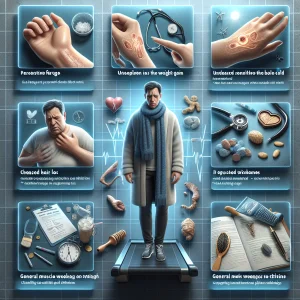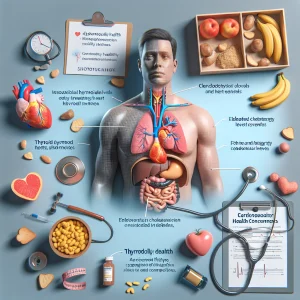Understanding the Serious Health Risks of Hypothyroidism in Men for Improved Wellness
Hypothyroidism in men represents a critical health challenge where the thyroid gland fails to produce adequate levels of vital thyroid hormones. These hormones, especially thyroxine (T4) and triiodothyronine (T3), are essential for maintaining numerous bodily functions, including metabolism, energy levels, and overall vitality. While anyone can develop hypothyroidism, men may face distinct symptoms and issues that significantly impair their quality of life. Gaining a comprehensive understanding of this disorder is crucial for effective management and treatment, enabling individuals to pursue appropriate interventions and improve their health outcomes.
Identifying the specific characteristics of hypothyroidism is paramount for establishing effective treatment and management plans. Often, men might overlook the symptoms of this condition due to their often subtle nature, mistakenly attributing them to stress, lifestyle changes, or the aging process. This common misperception can lead to persistent discomfort, complications, and a marked decline in well-being if left unaddressed. Therefore, recognizing the importance of early diagnosis is crucial for achieving optimal health outcomes and maintaining a high quality of life.
The causes of hypothyroidism are varied and can include autoimmune disorders like Hashimoto’s thyroiditis, side effects from medications, or complications from previous radiation therapy. Early identification and understanding of the symptoms are vital for timely intervention, which can lead to enhanced health and an improved quality of life.
Essential Information on Hypothyroidism Every Man Should Be Aware Of
- Hypothyroidism in men indicates a lack of thyroid hormone production by the thyroid gland, resulting in various physical and psychological health issues that require prompt attention.
- Physical manifestations of hypothyroidism may include persistent fatigue, unanticipated weight gain, thinning hair, and muscle weakness. Furthermore, this condition can elevate cholesterol levels, increasing the risk of heart disease and diabetes over time.
- The emotional and psychological effects of hypothyroidism in men may encompass depression, anxiety, and cognitive challenges, significantly impacting overall life satisfaction and daily functioning.
- Hypothyroidism can detrimentally influence sexual health, leading to reduced libido, erectile dysfunction, and potential fertility issues, which can place a considerable strain on personal relationships.
- Men suffering from hypothyroidism often find it challenging to control their weight, as the condition slows metabolic rates, complicating weight loss efforts and necessitating customized dietary and exercise strategies.
 Identifying the Key Physical Symptoms and Health Risks Associated with Hypothyroidism
Identifying the Key Physical Symptoms and Health Risks Associated with Hypothyroidism
The physical symptoms of hypothyroidism can differ greatly among individuals, often making diagnosis challenging. Many men report experiencing chronic fatigue, unexpected weight gain, heightened sensitivity to cold, and generalized muscle weakness. It’s not uncommon for those affected to feel drained even after a full night’s rest or to struggle with weight loss despite adhering to a healthy diet and maintaining an active lifestyle. These physical difficulties can lead to self-doubt regarding personal fitness goals and overall health.
Additionally, hypothyroidism may present itself in more subtle forms, such as changes in skin texture, including dryness and pallor, along with an increase in hair loss or thinning. It is essential to address these concerns early to facilitate effective management and to prevent further complications stemming from the condition. A decreased heart rate may also develop, contributing to feelings of lethargy and reduced stamina during physical activities.
The cumulative impact of these physical symptoms can dramatically disrupt daily routines and overall functionality. Therefore, seeking medical advice is imperative if you suspect that hypothyroidism may be influencing your health and well-being.
Understanding the Mental and Emotional Implications of Hypothyroidism
The mental and emotional consequences of hypothyroidism are frequently undervalued, yet they are of immense importance. As thyroid hormone levels decline, individuals may undergo mood fluctuations, increased feelings of depression, or heightened anxiety. These emotional disturbances can lead to irritability and chronic fatigue, exerting pressure on personal relationships and diminishing overall life satisfaction.
Research underscores the intricate relationship between thyroid function and mental health, highlighting the necessity of recognizing this connection for effective management. Cognitive capabilities may also be compromised due to hypothyroidism, leading to experiences often referred to as “brain fog.” Individuals may find it challenging to concentrate, forget minor tasks, or feel mentally sluggish, particularly in fast-paced settings where clarity is critical.
Recognizing these cognitive and emotional symptoms is essential for advocating for appropriate medical intervention. For further insights on the complex interplay between hypothyroidism and mental health, consider exploring the comprehensive information available on the Mayo Clinic website.
 The Significant Effects of Hypothyroidism on Men’s Sexual Health
The Significant Effects of Hypothyroidism on Men’s Sexual Health
Hypothyroidism can profoundly impact sexual health in men, leading to a range of complications. Reduced levels of thyroid hormones may result in decreased libido, erectile dysfunction, and even infertility. You might observe a significant decline in interest in sexual activities or encounter difficulties in achieving or maintaining an erection, which can be emotionally distressing.
These issues surrounding sexual health can foster feelings of inadequacy, frustration, or anxiety within intimate relationships. Furthermore, the hormonal imbalances associated with hypothyroidism can disrupt testosterone levels, complicating the already intricate dynamics of sexual health. Low testosterone levels can lead to heightened fatigue, mood fluctuations, and diminished sexual desire, creating a challenging cycle that may seem daunting to overcome.
It is crucial to address these sexual health concerns with your healthcare provider to explore effective treatment options aimed at restoring both thyroid function and sexual health, thereby ensuring a holistic approach to overall well-being.
Effective Strategies for Managing Weight Challenges Related to Hypothyroidism
Weight management becomes particularly arduous for men diagnosed with hypothyroidism. The metabolic slowdown commonly associated with low thyroid hormone levels can hinder your ability to achieve or maintain a healthy weight. Despite adhering to a consistent exercise regimen and a balanced diet, you may find that losing those extra pounds feels like an uphill struggle, leading to frustration and hopelessness regarding weight management.
Understanding the nexus between hypothyroidism and weight gain is crucial for developing effective strategies that yield results. Collaborating with a healthcare provider can help you create a tailored plan that addresses both thyroid health and weight management goals. This strategy may involve medication adjustments, dietary modifications, and personalized exercise routines designed to enhance metabolism in accordance with your energy levels.
 Investigating the Relationship Between Hypothyroidism and Cardiovascular Health Risks
Investigating the Relationship Between Hypothyroidism and Cardiovascular Health Risks
The correlation between hypothyroidism and cardiovascular health raises significant concerns for men diagnosed with this condition. Low thyroid hormone levels can lead to elevated cholesterol levels, which increase the risk of heart disease over time. It is essential to recognize that the fatigue and lethargy often experienced may not solely be symptoms of hypothyroidism, but could also indicate underlying cardiovascular issues that require attention.
Regular cardiovascular health assessments are vital for individuals diagnosed with hypothyroidism. Your healthcare provider may recommend lifestyle changes, such as adopting a heart-healthy diet rich in fruits, vegetables, whole grains, and lean proteins. In addition, engaging in consistent physical activity tailored to your energy levels can promote thyroid function and enhance cardiovascular health. By proactively managing both thyroid health and cardiovascular fitness, you can significantly mitigate the risk of further complications.
Understanding Hypothyroidism’s Impact on Male Fertility: Essential Insights
Fertility issues represent another crucial aspect linked to hypothyroidism in men. Low thyroid hormone levels can disrupt the delicate hormonal balance necessary for sperm production and overall reproductive health. If you are encountering challenges with conception, it is essential to consider how your thyroid function may be influencing your fertility journey.
Effectively managing hypothyroidism through appropriate treatment not only improves your overall health but also enhances the likelihood of successful conception. Working with a knowledgeable healthcare provider who understands the intricate relationship between thyroid function and fertility is essential for developing a comprehensive strategy that addresses both concerns. This may include regular monitoring of hormone levels through blood tests and necessary adjustments to medications aimed at optimizing reproductive health.
Holistic Approaches for Effectively Managing and Treating Hypothyroidism in Men
Successfully managing hypothyroidism requires a comprehensive approach that incorporates regular monitoring through blood tests, medication management, lifestyle changes, and effective communication with healthcare professionals. Blood tests are fundamental for diagnosing hypothyroidism, as they assess critical indicators like Thyroid-Stimulating Hormone (TSH) and T4 levels. Elevated TSH levels typically indicate an underactive thyroid, while low T4 levels confirm the diagnosis.
Upon diagnosis, treatment usually involves hormone replacement therapy using synthetic thyroid hormones, such as levothyroxine. This medication helps restore normal hormone levels, alleviating numerous symptoms associated with hypothyroidism. Regular follow-ups are essential for evaluating treatment effectiveness and making necessary adjustments based on blood test results.
In addition to medication, lifestyle adjustments—such as adopting a nutrient-rich diet that supports thyroid health, including sufficient iodine, selenium, and zinc—can be beneficial. Engaging in regular exercise tailored to your energy levels also assists in managing symptoms while enhancing overall vitality. By actively participating in your health management through education, collaboration with healthcare providers, and lifestyle changes, you can lead a fulfilling life despite the challenges posed by hypothyroidism.
Common Questions Regarding Hypothyroidism in Men
What defines hypothyroidism in men?
Hypothyroidism in men characterizes a condition where the thyroid gland fails to produce adequate levels of thyroid hormones, leading to a metabolic slowdown and various health complications that must be addressed.
What symptoms are typically associated with hypothyroidism in men?
Common symptoms of hypothyroidism in men include persistent fatigue, weight gain, cold intolerance, dry skin, constipation, muscle weakness, and feelings of depression, all of which can significantly affect daily life.
How is hypothyroidism diagnosed in men?
The diagnosis of hypothyroidism in men is established through blood tests that measure levels of thyroid-stimulating hormone (TSH) and thyroxine (T4) in the bloodstream, which help to evaluate thyroid function and overall health.
What factors contribute to the development of hypothyroidism in men?
The primary cause of hypothyroidism in men is often an autoimmune disorder known as Hashimoto’s thyroiditis. Other contributing factors may include thyroid surgery, radiation therapy, and specific medications that can disrupt thyroid hormone production.
What treatment options are available for men experiencing hypothyroidism?
Men diagnosed with hypothyroidism generally receive treatment through synthetic thyroid hormone medications, such as levothyroxine, which help replace deficient hormones and restore normal thyroid function, thus improving overall health.
Can hypothyroidism lead to additional health complications in men?
If left untreated, hypothyroidism in men can result in serious complications such as heart disease, fertility issues, and mental health disorders. Seeking timely treatment is vital to mitigate these risks and safeguard overall health.
This Content Is Sponsored By: Thyroid Testing UK
Hypothyroidism in Men: The Impact On Health Was First Published By https://bloodtest.co.uk
Find Us On Facebook: EZ Blood Tests
The Article: Hypothyroidism in Men: Health Implications Explored appeared first on: https://ezbloodtest.com
The Article Hypothyroidism in Men: Exploring Health Implications Was Found On https://limitsofstrategy.com



I always thought being a little low-energy was just part of the “dad life” package—turns out it could be my thyroid throwing a tantrum! It’s wild how easily we shrug off symptoms like fatigue or weight gain, attributing them to age or lifestyle rather than something like hypothyroidism. And let’s not even get started on how many “quick fixes” we try that don’t address the root of the problem. Maybe we should start a support group for guys who are just trying to navigate life with a sluggard thyroid while avoiding the dreaded “miserable dad” stereotype. Anyone up for some thyroid-friendly snacks and a good old-fashioned chat about our bodies not being so reliable?